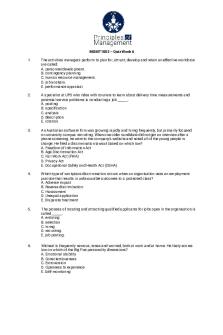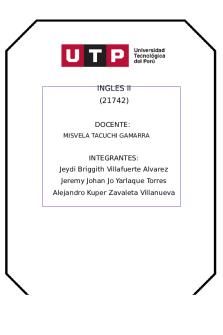Week 6 quiz - week 6 quiz with answers PDF

| Title | Week 6 quiz - week 6 quiz with answers |
|---|---|
| Course | Critical Reasoning |
| Institution | Chamberlain University |
| Pages | 12 |
| File Size | 93.2 KB |
| File Type | |
| Total Downloads | 5 |
| Total Views | 165 |
Summary
week 6 quiz with answers...
Description
Week 6 Checkpoint Quiz
Due Feb 15 at 1:59am
Points 100
Questions 14
Available Feb 7 at 1:59am - Feb 15 at 1:59am 8 days
Time Limit None Instructions Required Resources Read/review the following resources for this activity:
Textbook: Chapter 12, 14
Lesson Instructions The checkpoint quizzes are short assessments that will check your understanding of the terms and concepts from the reading. Time limit: none Attempts: 1
Grading This quiz will be graded based on correctness of response. Course Outcomes (CO): 3, 4 Due Date: By 11:59 p.m. MT on Sunday This quiz was locked Feb 15 at 1:59am. Attempt History
A S
t T
c
t i
o
e m
r
m e
e
p t L
A
4
1
A
t
3
0
T
t
E
e
m
S
m
i
o
T
p
n
u
t
u
t
0
t 1
e
o
A S
t T
c
t i
o
e m
r
m e
e
p t
f
s
1 0 0
Score for this quiz: 100 out of 100 Submitted Feb 10 at 7:21pm This attempt took 43 minutes.
Question 1 4 / 4 pts What are the three fundamental reasoning strategies listed in the text? Your Answer: Comparative Reasoning
Ideological Reasoning Empirical Reasoning
Question 2 6 / 6 pts What is comparative reasoning? On what skill is it based? Your Answer: Comparative reasoning is used to illustrate, illuminate , suggest or hypothesize the process of using what is familiar to make interpretations , explanations or inferences about what is less familiar . It is based on critical thinking skills .
Question 3 20 / 20 pts We learned four tests for evaluating arguments: truthfulness of the premises, logical strength, relevance, and non-circularity. How well do these tests work with respect to evaluating comparative reasoning? Consider each of the four tests. Your Answer: Test # 1 - Are the premises all True ?
This test will not work with evaluating comparative reasoning because true or false are used mainly for evaluating the comparison . Test # 2 - Are there counter examples and how difficult is it to imagine them ? This question helps gauge the logical strength of the analogy .It helps to categorize comparisons as more or less plausible . This will not work well comparative reasoning because there are too many cases of similarities and dissimilarities . Test # 3 - Are the premises relevant to the truth of the conclusion? The conclusion is the assertion about the characteristics of the unfamiliar topic or object . It helps to establish the relevance of comparisons between topics. Test # 4 -Does the truth of any premise depend on the truth of the conclusion? Comparative interference should flow from what we know to what we project to be true . Lastly this does not work because in comparative reasoning there is unfamiliarity . If something is unfamiliar it is hard to connect premise and conclusion . The four tests for evaluating comparative reasoning does not work with respect to evaluating comparative reasoning .
Question 4 10 / 10 pts Briefly explain how we can determine if one comparison is more comprehensive than another. Your Answer: To determine if one comparison is more comprehensive than another we can utilize the following questions: Are the premises all true ? Are there any counter examples and how difficult is it to imagine them ? Are the premises relevant to the truth of the conclusion Does the truth of any premise depend on the truth of the conclusion ?
Question 5 10 / 10 pts According to the text, the basic question to ask when evaluating a comparison between two objects or ideas or events is “Are they alike enough in the important ways or not?” (p. 248). What are those “important ways” that determine the credibility of conclusions based on similarities? Your Answer:
There are 5 criteria for evaluating comparative reasoning 1.Familarity 2.Simplicity 3.Comprehensivness 4.Productivity 5.Testability
Question 6 2 / 2 pts In your own words, define empirical reasoning. Your Answer: Empirical reasoning is when an individual uses their own personal experiences and premises that they hold to be true and use their own experiences to support their argument.
Question 7 2 / 2 pts What are the three defining characteristics of empirical reasoning? Your Answer:
Inductive Self corrective Independent verification
Question 8 2 / 2 pts What is meant by “the null hypothesis”? Your Answer: An empirically testable hypothesis that two incidents are entirely unrelated except perhaps by random chance .
Question 9 2 / 2 pts What is the purpose of empirical reasoning? Your Answer: The purpose of empirical reasoning is to explain , predict or control what happens . These are three powerful and interconnected purposes .
Question 10
2 / 2 pts How do we evaluate empirical reasoning? Your Answer: 1.The truthfulness of the premises 2.logical strength 3.relevancy 4.whether non circularity or not 5.Peer review
Question 11 10 / 10 pts What part of a research study addresses the test for logical strength, and how is it addressed? Your Answer: Operational Design part defines logical strength of the research study. This part consist of three major sub-parts which help to get the test results as follows: Presentation: This part helps to present all collected data based on research requirements which support research test. Analysis: This is one of the most powerful subpart of operational design
part that defines how data is logically connected and how methods are helpful to determine research elements so that to connect them for getting the research test samples. Interpretation: This part addresses how data is logically connected among elements so that to understand research test results so this part is helpful in defining the research outcomes means this part defines research results. So, operational design part is most helpful in defining the logical strengthen of research test.
Question 12 10 / 10 pts Briefly explain the process of peer review. What is the process of peer review designed to do? Your Answer: Peer review is a process where a group of author or a single author's work is reviewed under scrutiny by experts in the same field . It is designed to assess the validity , quality and originality of articles for publication . It is a way to ensure improvement to the quality of manuscripts that are deemed suitable for publication in the various fields that a study was done .
Question 13 10 / 10 pts The authors of our text state: “We have 40 years of data across multiple studies that confirm the positive correlation between taking a course in critical thinking and improvements in the students’ pretest to post-test critical thinking skills scores. It would be a mistake, therefore, all things being equal, to say that growth in critical thinking and taking a course in critical thinking are unrelated” (p. 290). The null hypothesis is false. Does that mean, therefore, that taking a critical thinking course causes students to become more skilled at critical thinking and more motivated to use those skills? Explain your answer. Your Answer: By taking a critical reasoning course we develop the skills and tools and are able to recognize the strategies being used in an argument. Once we are able to recognize and use these skills and tools via taking a critical reasoning course, we are able to notice this in real life and can use the skills we developed as well in real life. Just because the null is false does not make the opposite true .
Question 14 10 / 10 pts
If reasoning is empirical, contains statistics, and appears in print, should we take for granted that it has passed the four tests of truthfulness of the premises, logical strength, relevance, and non-circularity? Explain your answer. Your Answer: We should not always take it for granted if it is peer-reviewed. If it is peer-reviewed, others have already gone through the process to make sure that it passes the four tests. If the reasoning itself is empirical, contains statistics and appears in print then it should be truthful but we have to keep in mind that even if a article is peer reviewed , we must not take it for granted until we have done the research and examined it ourselves . Quiz Score: 100 out of 100...
Similar Free PDFs

Microsoft Word - Week 6 Quiz
- 2 Pages

Quiz 1 - Online quiz in week 6
- 6 Pages

Week 6 mod 6 quiz - Answer Key
- 16 Pages

Week 6 Week 6 Week 6Week 6
- 2 Pages

Week 2 Quiz + Answers
- 11 Pages

Quiz 6 - Quiz 6
- 2 Pages

Week 6 ingles Week 6
- 2 Pages

Week 6 Assignment - Week 6
- 11 Pages

Chapter 6 Quiz Answers
- 9 Pages
Popular Institutions
- Tinajero National High School - Annex
- Politeknik Caltex Riau
- Yokohama City University
- SGT University
- University of Al-Qadisiyah
- Divine Word College of Vigan
- Techniek College Rotterdam
- Universidade de Santiago
- Universiti Teknologi MARA Cawangan Johor Kampus Pasir Gudang
- Poltekkes Kemenkes Yogyakarta
- Baguio City National High School
- Colegio san marcos
- preparatoria uno
- Centro de Bachillerato Tecnológico Industrial y de Servicios No. 107
- Dalian Maritime University
- Quang Trung Secondary School
- Colegio Tecnológico en Informática
- Corporación Regional de Educación Superior
- Grupo CEDVA
- Dar Al Uloom University
- Centro de Estudios Preuniversitarios de la Universidad Nacional de Ingeniería
- 上智大学
- Aakash International School, Nuna Majara
- San Felipe Neri Catholic School
- Kang Chiao International School - New Taipei City
- Misamis Occidental National High School
- Institución Educativa Escuela Normal Juan Ladrilleros
- Kolehiyo ng Pantukan
- Batanes State College
- Instituto Continental
- Sekolah Menengah Kejuruan Kesehatan Kaltara (Tarakan)
- Colegio de La Inmaculada Concepcion - Cebu






